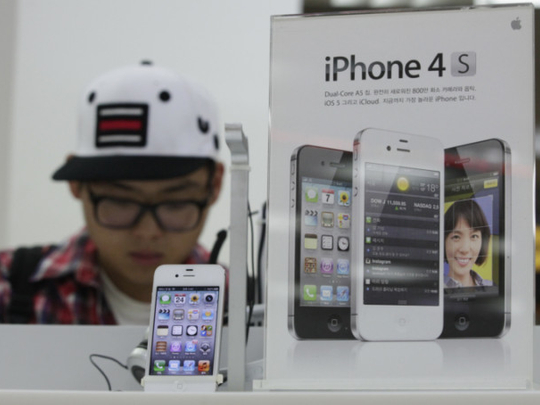
San Jose: Apple Inc didn’t infringe two patents owned by Google Inc’s Motorola Mobility unit for wireless technologies used throughout the electronics industry, a US trade agency said today in a decision that reduces the likelihood of an import ban on the iPhone.
The US International Trade Commission didn’t completely resolve the companies’ dispute, ordering a trade judge to reconsider Motorola Mobility’s claim that Apple violated another patent. The judge had previously found no violation of that patent, which applies to a sensor used to determine the proximity of a person’s head to the phone so it doesn’t accidentally hang up.
The commission could have stopped shipments of the iPhone and iPad at the border had it upheld Judge Thomas Pender’s earlier finding that Apple infringed a patent for 3G technology. That determination had prompted criticism that the agency shouldn’t ban imports of products that infringe patents related to technological standards used by an entire industry.
The sensor patent that’s still in dispute is for a feature that isn’t related to industrywide specifications and, thus, could be easier to work around.
“Motorola was one of the earliest mobile phone innovators, and much of Apple’s success builds on our foundational work,” Christa Smith, a Motorola Mobility spokeswoman, said in a statement. “We’re considering our options as we continue to push for patent peace.”
Kristin Huguet, a spokeswoman for Apple, didn’t immediately return a message seeking comment.
Motorola Mobility, which Mountain View, California-based Google bought in May, contended in the case that Apple infringes four patents, including two that relate to industry standards for 3G wireless and Wi-Fi technologies.
The iPhone’s $47 billion in sales and the $20.4 billion in iPad sales together made up more than 62 per cent of Cupertino, California-based Apple’s sales in fiscal 2011, according to data compiled by Bloomberg.
As part of its review, the commission said it would consider whether patents that are essential to following industrywide technology standards should be treated differently than other patents in cases at the ITC.
The trade commission released its decision shortly before a federal jury in San Jose, California, ordered Samsung Electronics Co. to pay Apple more than $1 billion for infringing patents that cover features including pinch-to-zoom and copying the design of the iPhone. The jury cleared Apple of allegations that it infringed Samsung patents.
The US Federal Trade Commission, some members of Congress and Intel Corp have argued that the ITC shouldn’t issue import bans on so-called standard-essential patents.
The notice posted on the International Trade Commission’s website gave no indication where the agency stands on that issue. The full decision won’t be made public until both sides get a chance to redact confidential information.
Google inherited the dispute when it spent $12.5 billion to buy Motorola Mobility. The company is counting on the handset maker’s long history in the mobile phone space - and its trove of 17,000 patents - to force Apple into a settlement that could encompass other handset makers that use Google’s Android operating system, including Samsung and HTC Corp.










